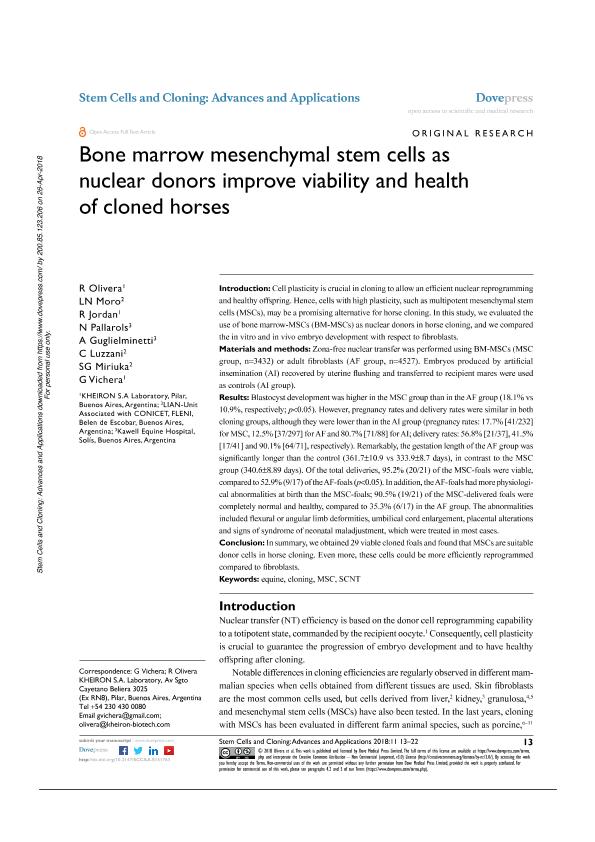Artículo
Bone marrow mesenchymal stem cells as nuclear donors improve viability and health of cloned horses
Olivera, R.; Moro, Lucía Natalia ; Jordan, R.; Pallarols, N.; Guglielminetti, A.; Luzzani, Carlos Daniel
; Jordan, R.; Pallarols, N.; Guglielminetti, A.; Luzzani, Carlos Daniel ; Miriuka, Santiago Gabriel
; Miriuka, Santiago Gabriel ; Vichera, Gabriel Damian
; Vichera, Gabriel Damian
 ; Jordan, R.; Pallarols, N.; Guglielminetti, A.; Luzzani, Carlos Daniel
; Jordan, R.; Pallarols, N.; Guglielminetti, A.; Luzzani, Carlos Daniel ; Miriuka, Santiago Gabriel
; Miriuka, Santiago Gabriel ; Vichera, Gabriel Damian
; Vichera, Gabriel Damian
Fecha de publicación:
14/02/2018
Editorial:
Dove Press
Revista:
Stem Cells and Cloning: Advances and Applications
e-ISSN:
1178-6957
Idioma:
Inglés
Tipo de recurso:
Artículo publicado
Clasificación temática:
Resumen
Introduction: Cell plasticity is crucial in cloning to allow an efficient nuclear reprogramming and healthy offspring. Hence, cells with high plasticity, such as multipotent mesenchymal stem cells (MSCs), may be a promising alternative for horse cloning. In this study, we evaluated the use of bone marrow-MSCs (BM-MSCs) as nuclear donors in horse cloning, and we compared the in vitro and in vivo embryo development with respect to fibroblasts. Materials and methods: Zona-free nuclear transfer was performed using BM-MSCs (MSC group, n=3432) or adult fibroblasts (AF group, n=4527). Embryos produced by artificial insemination (AI) recovered by uterine flushing and transferred to recipient mares were used as controls (AI group). Results: Blastocyst development was higher in the MSC group than in the AF group (18.1% vs 10.9%, respectively; p<0.05). However, pregnancy rates and delivery rates were similar in both cloning groups, although they were lower than in the AI group (pregnancy rates: 17.7% [41/232] for MSC, 12.5% [37/297] for AF and 80.7% [71/88] for AI; delivery rates: 56.8% [21/37], 41.5% [17/41] and 90.1% [64/71], respectively). Remarkably, the gestation length of the AF group was significantly longer than the control (361.7}10.9 vs 333.9}8.7 days), in contrast to the MSC group (340.6}8.89 days). Of the total deliveries, 95.2% (20/21) of the MSC-foals were viable, compared to 52.9% (9/17) of the AF-foals (p<0.05). In addition, the AF-foals had more physiological abnormalities at birth than the MSC-foals; 90.5% (19/21) of the MSC-delivered foals were completely normal and healthy, compared to 35.3% (6/17) in the AF group. The abnormalities included flexural or angular limb deformities, umbilical cord enlargement, placental alterations and signs of syndrome of neonatal maladjustment, which were treated in most cases. Conclusion: In summary, we obtained 29 viable cloned foals and found that MSCs are suitable donor cells in horse cloning. Even more, these cells could be more efficiently reprogrammed compared to fibroblasts.
Archivos asociados
Licencia
Identificadores
Colecciones
Articulos(SEDE CENTRAL)
Articulos de SEDE CENTRAL
Articulos de SEDE CENTRAL
Citación
Olivera, R.; Moro, Lucía Natalia; Jordan, R.; Pallarols, N.; Guglielminetti, A.; et al.; Bone marrow mesenchymal stem cells as nuclear donors improve viability and health of cloned horses; Dove Press; Stem Cells and Cloning: Advances and Applications; 11; 14-2-2018; 13-22
Compartir
Altmétricas



